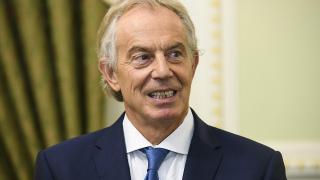March 18—Today we point to the re-emergence of Britain’s Tony Blair, the “Knight of the Garter” who declared at the Chicago Board of trade in 1999 the “end of the Westphalian Order” and the beginning of a set of British-inspired atrocities, from the bombing of the Chinese Embassy in former Yugoslavia, to the 2003 Iraq War, the 2011 assassination of Gaddafi and subsequent destruction of Libya, the 20-year occupation of Afghanistan, etc. Blair was just trotted out to make a Bertrand Russell-style argument that thermonuclear war against Russia is not only thinkable, but deployable. “When (Putin) is threatening NATO, even stoking fears of nuclear conflict … there is something incongruous about our repeated reassurance to him that we will not react with force…. But suppose (Putin) uses chemical weapons or a tactical nuclear weapon, or tries to destroy Kyiv as he did Aleppo in Syria, without any regard to the loss of civilian life—is it sensible to tell him in advance that whatever he does militarily, we will rule out any form of military response?” As Bertrand Russell told a BBC interviewer in 1958, in defense of his 1946 (and later) insane advocacy of nuclear war against the Soviet Union, “I thought the Russians would give way but you can’t threaten unless you’re prepared to have your bluff called.”
Also yesterday, David Starkey, British historian and imperialist, appearing on “The Colin Brazier Podcast” episode titled “Putin Represents A Return To Empire,” identified and advocated George Orwell’s 1984 characterization of global war between three fictional powers called “Oceania,” Eurasia" and Eastasia" as the most apt description of today’s Britain/America-Russia-China “rivalry,” the opposite of the Westphalian “benefit of the other.” “We’ve just had Tony Blair talking. We couldn’t keep his mouth shut, a bit like me, really, except I’m not a Knight of the Garter. But Tony Blair (was) saying what we should be doing, the fact that we should be deploying power, as well as threats of power.” A little later, he added: “Look at who is really taking on Russia. It is really just the Anglosphere…. The book that I have been getting obsessed about, because of its role in prophecy, is George Orwell’s 1984. Now we think of 1984 simply as this terrifying study of the relationship between tyranny and totalitarianism, and the individual. But it’s also set in this extraordinarily-conceived-of frame of international relations, in which the world has separated itself into three superpowers. And one of them is Oceania. Oceania is us and America. It’s the British Empire and America. Orwell sees it as having gone totalitarian socialist, like the rest. It didn’t. And it remains extraordinarily different. It’s rooted in common law. It’s rooted in the fact (that) we’re an island. America is an island. We’re an island. One of the problems of Ukraine is there are no frontiers….”
These Utopian ravings are only important to cite here as a corrective, and caution, to those that insist on a misdirected strategic analysis that would characterize the United States, rather than the British Empire, as calling the shots in the world’s current descent into thermonuclear war. The British conceive of the American as a wayward subject of what Winston Churchill referred to as “the Empire of the mind.” After 45-plus years of brainwashing by the Congress for Cultural Freedom—actually the Congress for Cultural Fascism—only a conscious rejection of Tony Blair’s anti-Peace of Westphalia outlook, starting with shutting down the City of London/Wall Street “everything bubble,” including its policy for looting the world called “sanctions,” will work. Sanctions, and the Malthusian depopulation policy for which they are the mere footprint and precursor, are aimed at the heart of America and Europe just as much as at Russia and China, (and of course the depopulation of Africa.)
If the world survives, it will be because the dialogue inspired by the “Call To Convoke a Conference To Establish a New Security and Development Architecture for All Nations” now allows us to not only avoid, but to supersede geopolitics, and the mistaken and possibly fatal strategic miscalculations that proceed from its vicious, civilization-destroying axioms. As Lyndon LaRouche said in his “The Historical Individual”: “During each tragic moment of great crisis, every nation, every culture is gripped by the need for a sudden and profound change in its quality of leadership. Its survival then depends upon its willingness to choose a new quality of leadership which is typified by those extraordinarily exceptional individuals who stood, in retrospect like immortal souls, apart from, and above mere popular taste of their time.”






